Related Research Articles

The Banat Republic was a short-lived state proclaimed in Timișoara c. 31 October 1918, during the dissolution of Austria-Hungary. The Republic claimed as its own the multi-ethnic territory of the Banat, in a bid to prevent its partition among competing nationalisms. Openly endorsed by the local communities of Hungarians, Swabians and Jews, the German-speaking socialist of Jewish origin Otto Roth served as its nominal leader. This project was openly rejected from within by communities of Romanians and Serbs, who were centered in the eastern and western halves of the region, respectively. The short-lived entity was recognized only by the neighboring Hungarian Republic, with which it sought a merger. Its military structures were inherited from the Common Army, and placed under the command of a Hungarian officer, Albert Bartha.
Dimitrie Macedonski was a Wallachian Pandur captain and revolutionary leader.

Victor Neumann is a Romanian historian, political analyst, and professor at the West University in Timișoara. He is a well-known specialist in the recent cultural and intellectual histories of Eastern and Central Europe. Much of his work deals with Conceptual History, history of political thought and theory of history. As of October 2013, he is Director of the Timișoara Art Museum.
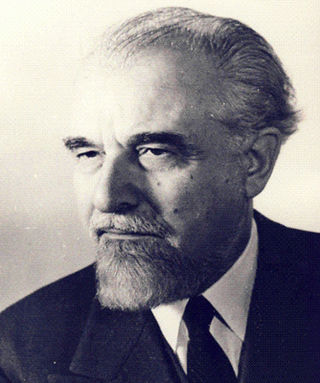
Ștefan Voitec was a Romanian Marxist journalist and politician who held important positions in the state apparatus of Communist Romania. Debuting as a member of the Socialist Party of Romania in his late teens, he formed the Socialist Workers Party of Romania, then the United Socialist Party, while also engaging in human rights activism and advocating prison reform. The mid-1930s brought him into contact with the Romanian Communist Party, with whom he formed tactical alliances; however, he rejected its political line, and was for a while known as a Trotskyist. In 1939, he joined the consolidated Social Democratic Party, which reunited various socialist groups outlawed by the National Renaissance Front. During World War II, despite ostensibly withdrawing form political life to do research, Voitec served as the party's Secretary and joined the anti-fascist underground. Some reports suggest that he was also a committed anti-communist, critical of the Soviet Union to the point on endorsing war in the East. As a war correspondent, Voitec made contributions to Nazi propaganda, an issue which made him vulnerable to blackmail in later decades.
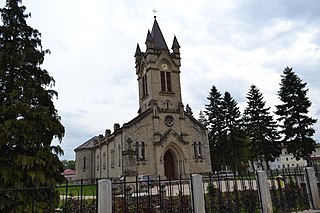
Oituz is a commune in Bacău County, Western Moldavia, Romania. It is composed of six villages: Călcâi (Zöldlonka), Ferestrău-Oituz (Fűrészfalva), Hârja (Herzsa), Marginea, Oituz and Poiana Sărată (Sósmező).
Camil Bujor Mureșanu was a Romanian historian, professor and author.
Sergiu Musteață is a historian from the Republic of Moldova and Dean of History and Geography Faculty, "Ion Creangă" State Pedagogical University.

Alexandru Ionescu was a Romanian typographer, early labour leader and socialist journalist. A founding member of Romanian Social Democratic Workers' Party (PSDMR), he was part of its leadership throughout its existence, at the same time working for the unionisation of the Romanian workers. One of the few party leaders with actual working-class background, Ionescu opposed collaboration with the bourgeois political parties, and continued to support the existence of a workers' party even after the other leaders of PDSMR decided on the party's dissolution. A founder, along fellow-minded socialists, of the Working-class Romania circle, Ionescu grew estranged from the main socialist grouping due to disagreements over the newly established labour legislation. Joining the government-sanctioned corporations, he supported at times ideas contradictory to his former socialist positions, but ultimately he rejected corporatism as a form of labour organisation. Despite some attempts at collaboration, he would never reintegrate in the mainstream socialist movement.
Volkswille, later renamed Arbeiter-Zeitung, was a German language newspaper published from Temesvár/Timișoara between 1893 and 1933. Volkswille was the main organ of the German-speaking labour movement in the Banat region. It was the sole long-lasting German-language socialist newspaper in the region.
Banater Arbeiter-Presse was a German language socialist newspaper published from Jimbolia, Romania between 1925 and 1927. The first issue of Banater Arbeiter-Presse was published on July 3, 1925. The newspaper was published weekly. Banater Arbeiter-Presse was an organ of the Banat Socialist Party. Banater Arbeiter-Presse was of great help for the socialist movement in Jimbolia, helping the party to win the local elections of 1926.
The Socialist Party of Transylvania was a political party in Romania, active primarily in Transylvania. Born out of the ethnic Romanian section of the Social Democratic Party of Hungary (MSZDP), it gradually attracted other socialist and social-democratic groups active in the Transleithanian lands of Austro-Hungary incorporated into the Kingdom of Romania after World War I. Although initially it claimed, under the title Social Democratic Party of Transylvania and Banat, the adherence of the MSZDP party sections in Banat, the latter, while maintaining close links with the Transylvania party, constituted themselves as a distinct political organization. The party also actively sought the cooperation of the socialist parties active in other regions of Romania, working towards a unified political party of the working class. Such plans were however soon thwarted by repression from the part of the Romanian authorities, as well as disagreements both inside the party and among the different socialist formations of Romania. The disagreements were further aggravated by the request of the Third International that the leaders of the party that had collaborated with the Romanian National Party be excluded from the merger, and eventually resulted in the split between the reformist social-democrats and the revolutionary-minded communists. While the former decided to retire from unification talks and re-establish an independent Transyvanian party, the latter joined the majority of Socialist Party of Romania (PSR) to create the Communist Party of Romania in May 1921. The social-democratic faction would late join the PSR members that disagreed with the new orientation of their party, founding the Romanian Social Democratic Party in 1927.

Alexandru Nicolau was a Romanian lawyer, socialist and later communist activist. Active in the Romanian and French socialist movements before and during World War I, he left for Russia during the 1917 Revolutions. There, he became one of the organisers of Romanian volunteer detachments in support of the Soviets. Arrested shortly after returning to Romania in 1920, he left for Soviet Russia after a successful prison escape. During the later part of his life he held teaching positions at several Soviet universities, before falling victim to the Great Purge in 1937. His name was posthumously rehabilitated both in the Soviet Union and in his native Romania.
The Socialist Workers Party of Romania, later renamed the Independent Socialist Party of Romania, was a political party in Romania. The party was founded in Bucharest on 15 July 1928, as a leftist splinter group of the Social Democratic Party, formed by a minority that opposed the cooperation with the National Peasants' Party.
Proletarul ('Proletarian') was a socialist newspaper published from Botoșani, Kingdom of Romania. The newspaper began publishing on 1 March (O.S.) (13 March ), 1892. It was the organ of the Workers Club of Botoșani. It was managed by an editorial committee. Amongst the contributors to Proletarul were Dr. Panait Zosin and Henric Sanielevici. It was published twice monthly, the typography was done as Goldșleger & Comp.
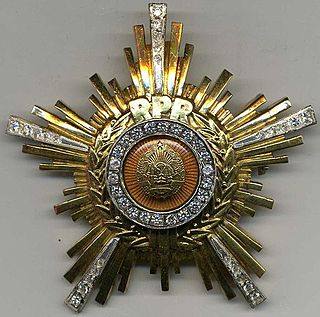
The Order of the Star of the Socialist Republic of Romania, from 1948 to 1965 the Order of the Star of the Romanian People's Republic, was the second-highest honor bestowed by the Socialist Republic of Romania. Established on 12 January 1948, during the regime's first month, it came in five classes:
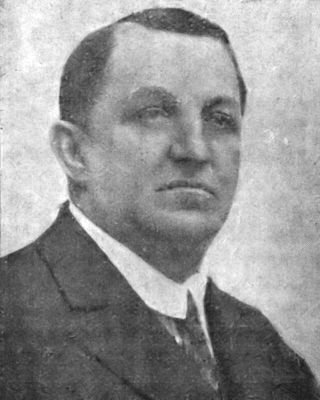
Avram Imbroane was an Austro-Hungarian-born Romanian politician, businessman, and Orthodox priest. Born in the western half of Banat, he was active in nationalist agitation among that region's Romanian community, and later also in Transylvania. By the time of World War I, he supported secession and the unconditional union of Transylvania and the Banat with the Kingdom of Romania. He fled Austria-Hungary and engaged in propaganda work—first in Romania, then among the Transylvanian prisoners-of-war in the Russian Republic. In late 1918, he returned to the Banat and became an active participant in the unionist struggle, participating in the assemblies of the Great Union.
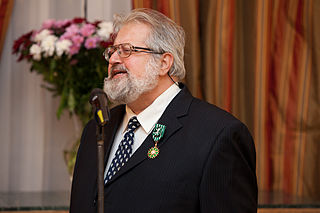
Andrei-Nicolae Pippidi is a Romanian historian and professor emeritus at the University of Bucharest. He specialised in South-Eastern European history of the 15th–19th century, in Romanian history of the Middle Ages and the Early Modern Period, and in the relationship between South-Eastern Europe and the Occident.

Ion Eduard Fuhn was a Romanian herpetologist. He published over 80 research papers.
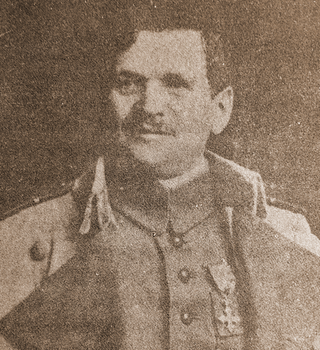
Marcel Olteanu was a Romanian brigadier general during World War I and the Hungarian–Romanian War.

The United Socialist Party was a political party in Romania, formed in 1933 through the merger of the Independent Socialist Party (PSI) and the Socialist Party. PSU was a small party but played an important role within the left-wing movement, especially through its repeated attempts to promote unity between the Communist Party (PCR) and Social Democratic Party (PSD). PSU was affiliated with the London-based International Bureau of Revolutionary Socialist Unity.
References
- 1 2 Societatea de Științe Istorice și Filologice din R.P.R. Studii şi articole de istorie , Vol 3-5. 1961. p. 349
- ↑ Institutul de Istorie (Academia Republicii Populare Romîne). [Studii și materiale de istorie contemporană], Vol. 2. [București]: Editura Academia Republicii Populare Romîne, 1962. p. 135
- ↑ Shafir, Michael. Romania, Politics, Economics, and Society: Political Stagnation and Simulated Change . Boulder, Colo: L. Rienner Publishers, 1985. p. 28
- ↑ Nishikawa, Masao, and Helmut Konrad. Socialists and International Actions for Peace 1914-1923 . Berlin: Frank & Timme, 2010. p. 142
- ↑ Stănescu, M. C. Mișcarea muncitorească din România în anii 1921-1924 . București: Editura politică, 1971. p. 139
- ↑ Marin, William. Josef Gabriel: Leben und Werk in Wort und Bild . București: Kriterion, 1988. p. 29
- ↑ Marin, William, and Ioan Luncan. Două secole de luptă revoluționară în sud-vestul României (1733-1948) . Timișoara: Facla, 1984. p. 57
- ↑ Jurca, Nicolae. L'histoire de la social-démocratie de Roumanie . Bucarest: FF Press, 2000. p. 178
- ↑ König, Walter. Siebenbürgen zwischen den beiden Weltkriegen . Köln [u.a.]: Böhlau, 1994. p. 44